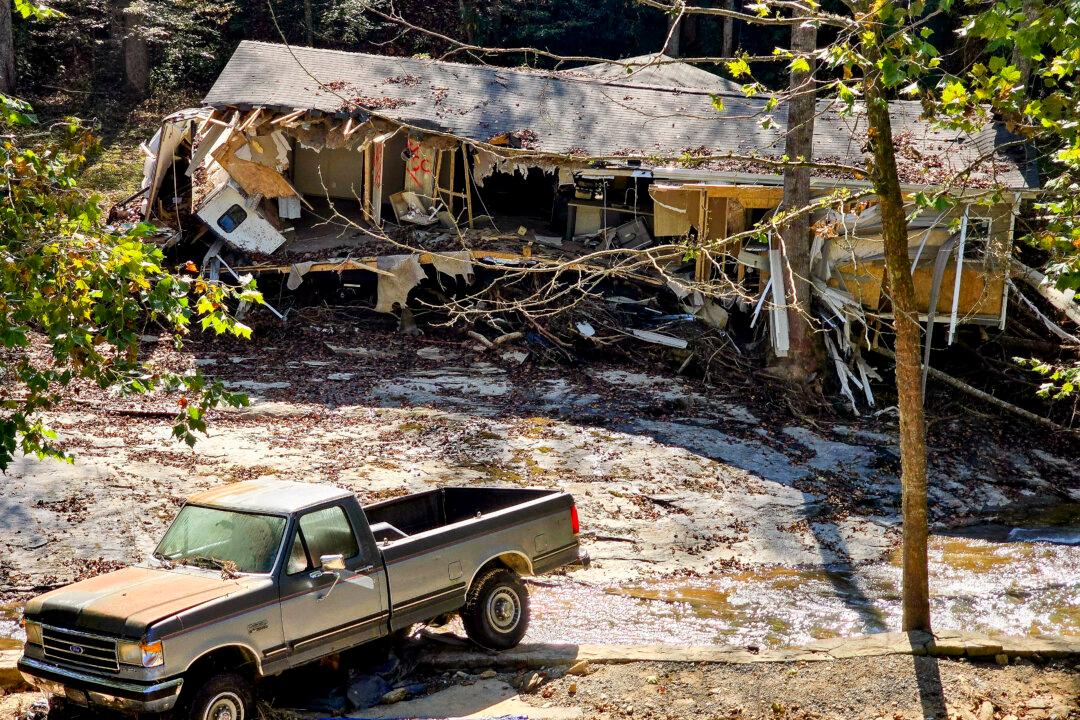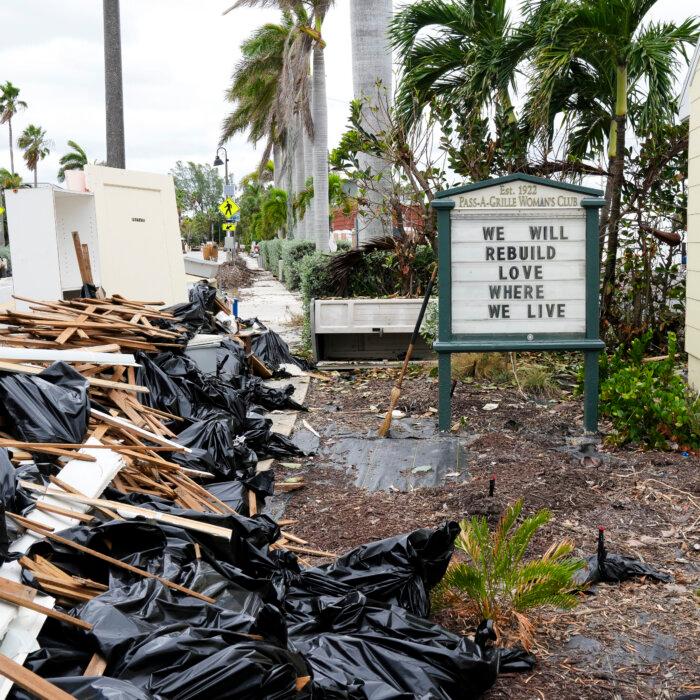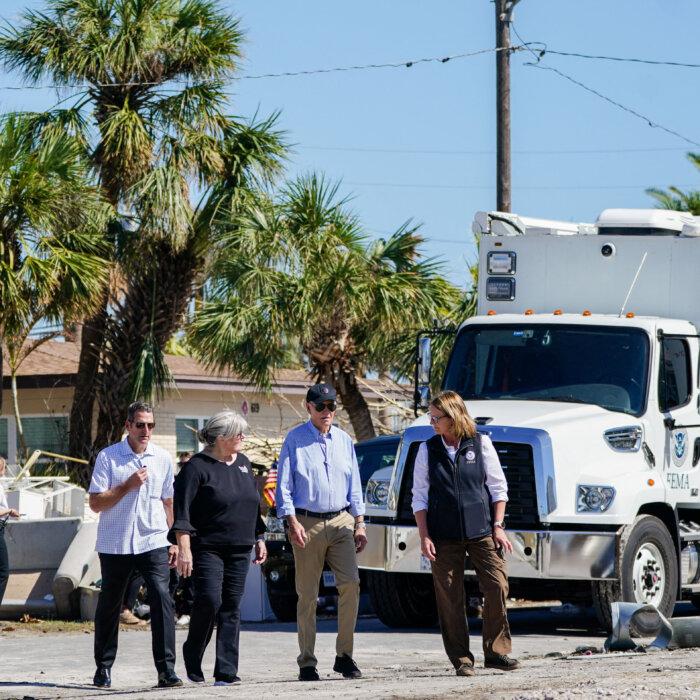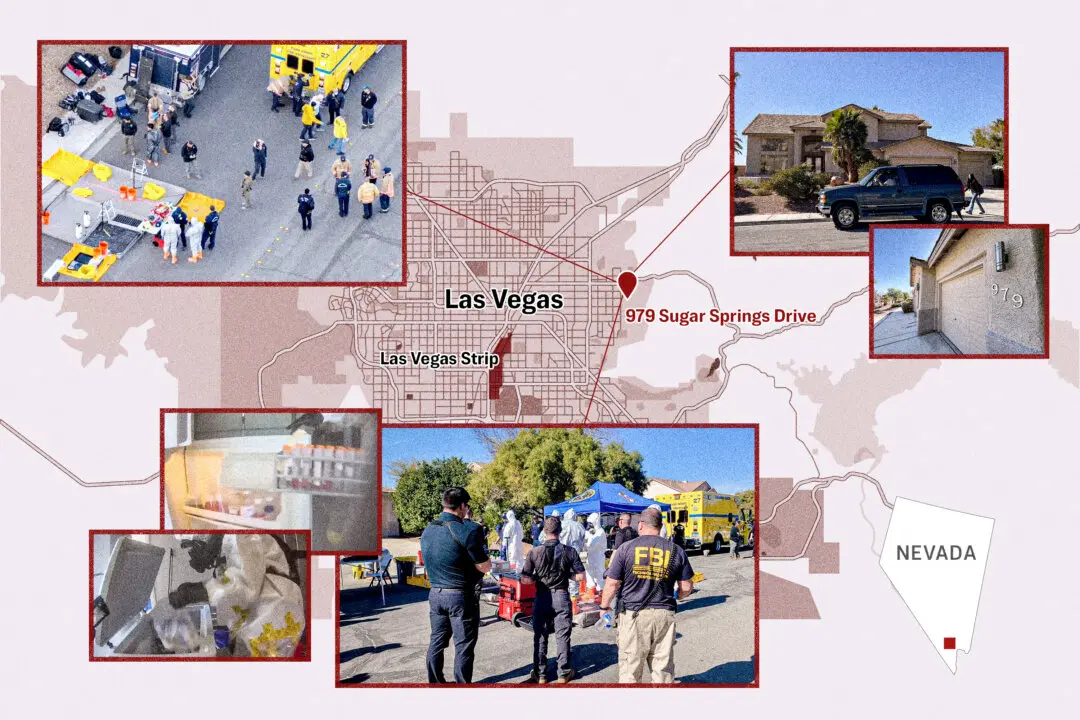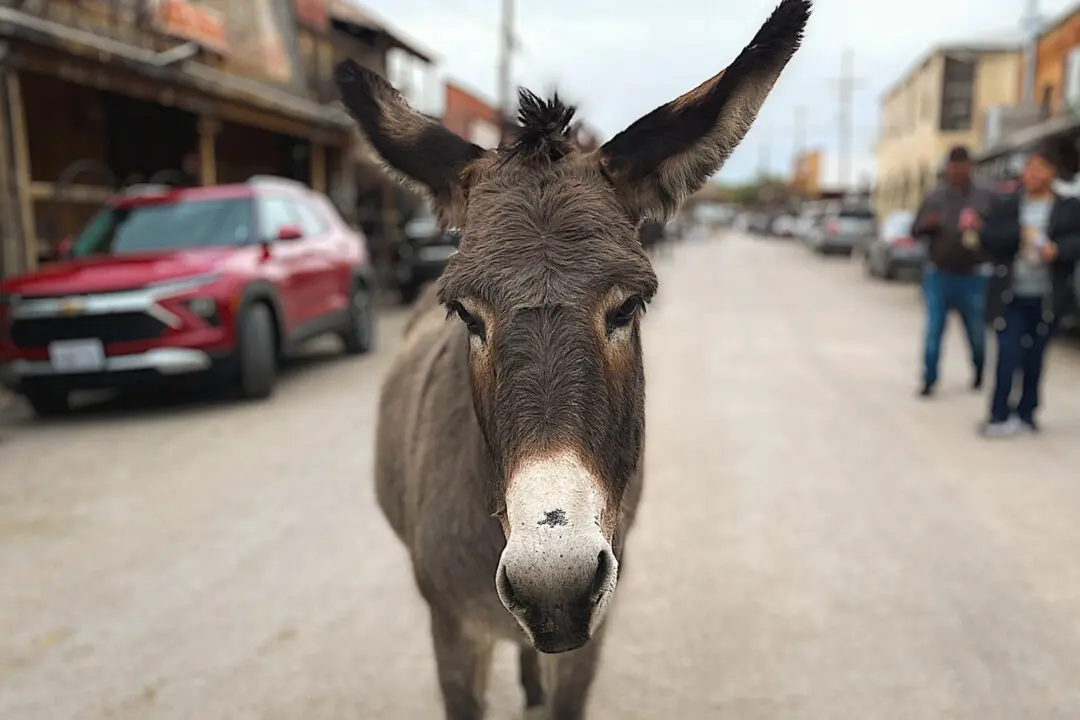BLACK MOUNTAIN, N.C.—Robert Chessick knows about nature’s power, having survived his fair share of tropical downpours and winter ice storms.
He said that prayer, buckets to collect rainwater, and a borrowed gasoline-powered generator helped him get through Hurricane Helene in late September.
“I was kind of prepared,” Chessick said.
Two weeks after the hurricane, Chessick, 74, known as Rabbit to his neighbors, wore a new pair of Carhartt overalls from Amazon. He spoke calmly and thoughtfully about what it was like to survive a monster storm like Helene.
“You go through it and try to check all the boxes. Then, you go through the could have, should have, would have [scenarios]. I should have had more gas. It’s all relative,” he said.
The region’s deadliest storm in decades has claimed the lives of more than 230 people across six states. Homes in communities not far from Chessick’s home had been caught in the terrifying winds and then washed away by the flood waters.
“Every death related to a hurricane is a tragedy. As recovery efforts remain underway, one of our top priorities is to ensure any person who has died in the storm and their family are treated with the dignity and respect they deserve,” the NCDHHS stated on its website.
Many unrecovered bodies remain buried in the debris and silt. Mudslides left only those who lived at higher altitudes unharmed.
Chessick said he'll never forget the lessons he learned from this storm.
“What I got from it was patience. Then, it was fortitude—and faith,” Chessick told The Epoch Times.
“There’s a light at the end of the tunnel that needs to be turned on. I think that’s how they put it on the radio. Those things you had to put forward so you didn’t run around like a chicken with your head cut off amid the chaos and confusion.”
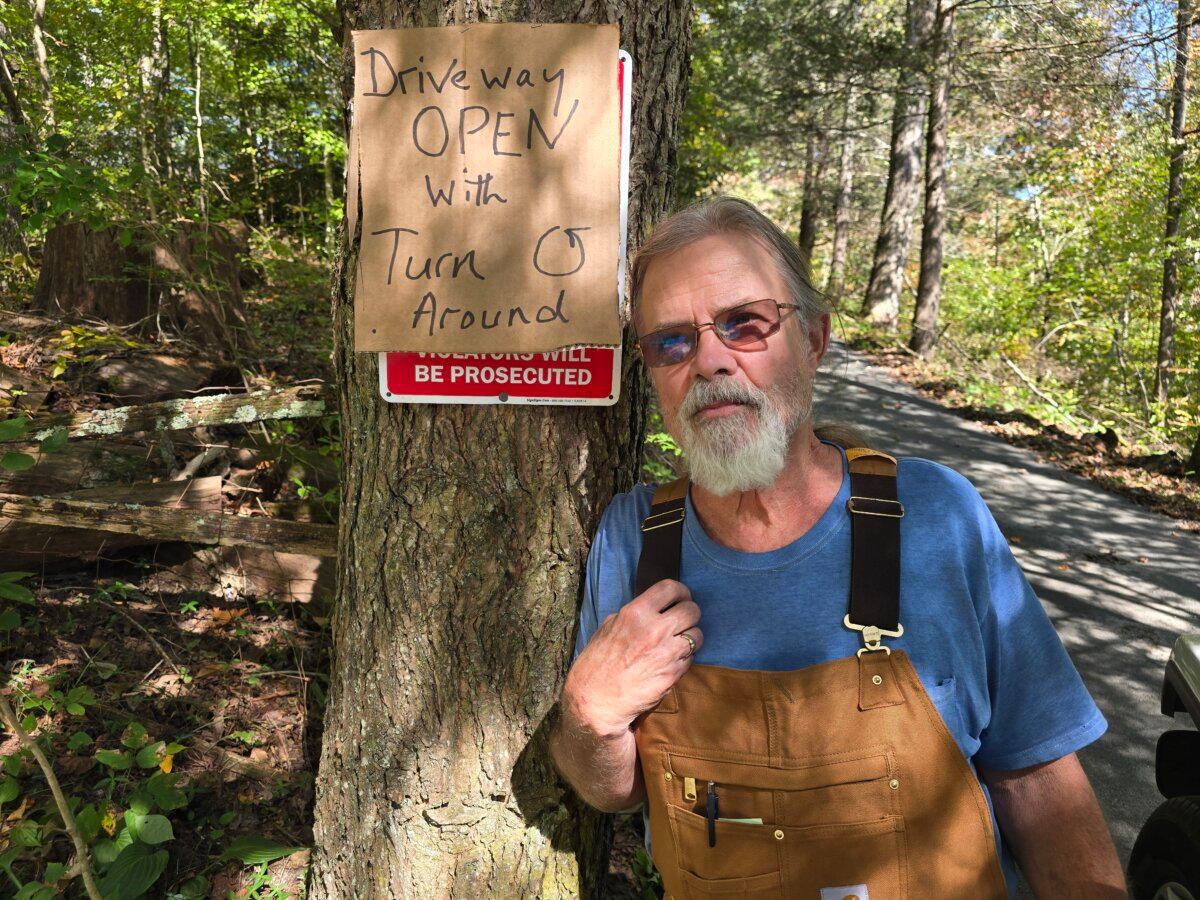
Long Road Ahead
By Oct. 4, Duke Energy had restored power to more than 2.16 million customers in the Carolinas. About 167,000 people in the mountains of North Carolina still didn’t have electricity.The company used helicopters to move power lines and sent workers to remote parts of the state heavily damaged by the storm.
“In the face of the extraordinary damage and destruction caused by Hurricane Helene, our communities have shown exceptional resiliency,” Jason Hollifield, Duke Energy’s storm director for the Carolinas, said in a statement.
“Duke Energy will be with the communities we serve every step of the way as they recover.”
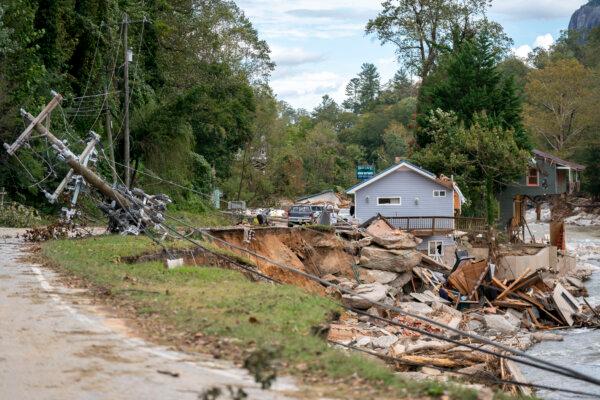
Many people in western North Carolina say that it’s one thing to replace material possessions lost in the storm. But how do you replace a loved one who has passed away?
“I’ve seen some rough things. I’ve heard some rough stories. I’ve talked with friends who will never be the same based on what they witnessed,” said Justin Honeywell, who lives in the higher elevations of Black Mountain.
“My house is fine. My neighborhood is relatively OK. We had a few washout spots and a small landslide. Everywhere around us, it’s devastation,” he said.
Honeywell said the disaster has given him a keener sense of what a storm like Helene can do to the area. Now, he realizes western North Carolina is just as vulnerable as the coastal towns.
“I thought it was a pretty easy area to survive in. The thing I’ve seen the most is just the sheer amount of community support—people just stepping out and helping out,” he said.
At Stone Mountain Baptist Church, Honeywell was sorting through stacks of donated goods on tables bound for other regional hubs. He said he saw this as a mission of mercy and a labor of faith for his stricken neighbors in their hour of need.
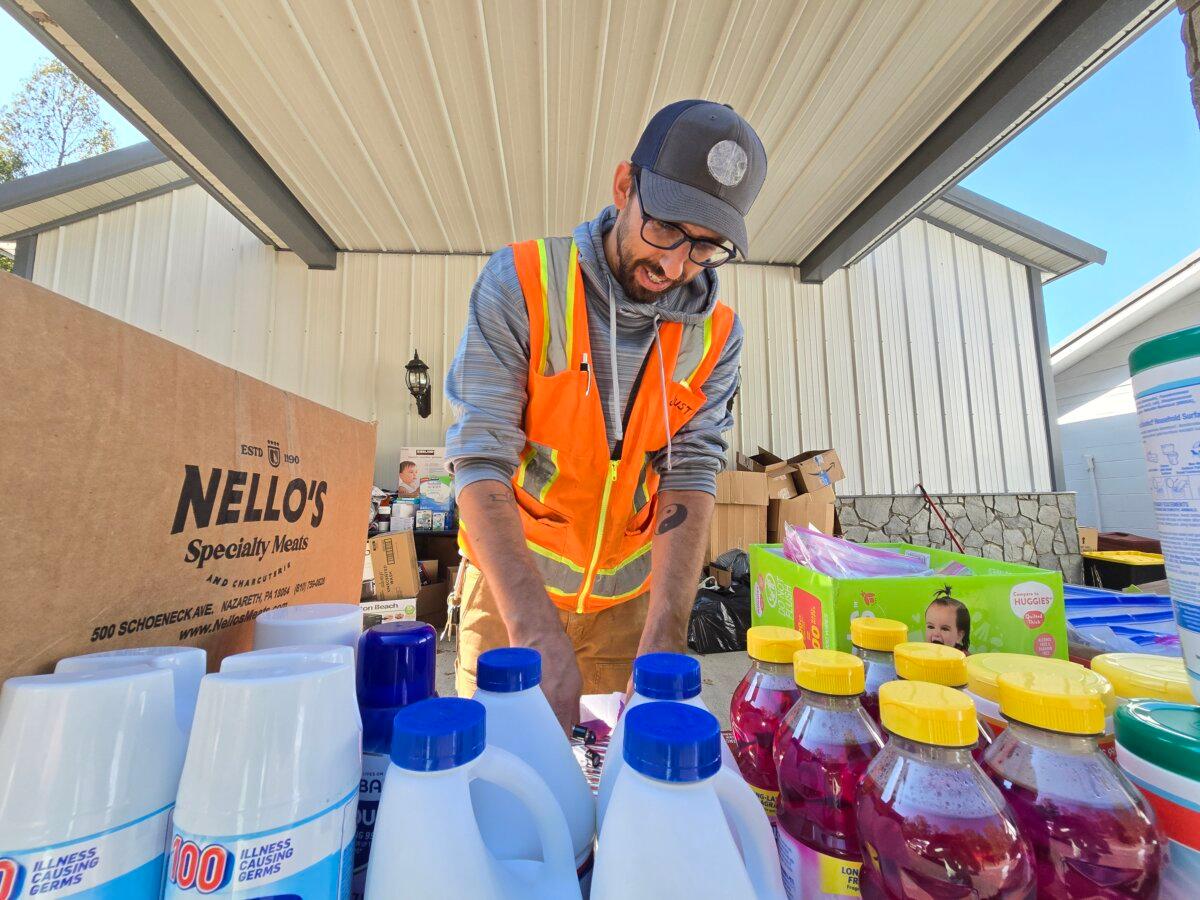
There were clothes to give away, bottles of water to prevent dehydration, and more food than volunteers could pack.
“This is all local stuff,” Honeywell told The Epoch Times. “I know there were airdrops, 99 percent of this stuff is all from local people driving through and dropping off stuff.
“The support from local people—that’s what I’ve seen the most.”
Having a pickup truck has been helpful in getting to more remote areas. Honeywell said one woman was about to give birth. She ended up getting flown to a local hospital by helicopter.
Another man was buried under the rubble of his house after it collapsed. But volunteers were able to help the man, who was severely hurt.
Like Many Storms—Combined
Nick George, who relocated to Black Mountain in December 2023, recounted his experiences with Hurricanes Francis and Wilma in 2004 and 2005 living in Florida.“This is well beyond anything I experienced from those storms—combined,” he said.
“It’s mind-blowing, quite frankly, the level of devastation I’ve seen.”
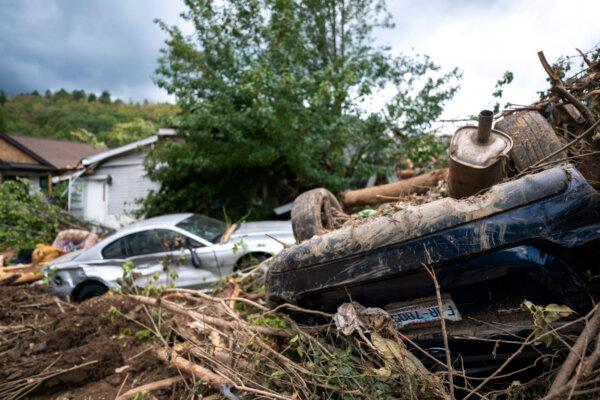
George said he was lucky to live at 3,000 feet above sea level—above the streams, creeks, and French Broad River, which became raging flood waters because of the torrential rain.
“It wasn’t until we made our way down to the Broad River Fire Department and saw how much silt ... how many cars moved from different locations due to the sudden rush of water,” he told The Epoch Times.
The unincorporated village of Bat Cave, about 32 miles southeast of Asheville by car, looked as if it had been “totally wiped off the map,” according to George.
“It’s crazy, too. Certain areas I’ve gone through—even across streets, rolling green hills if you look across the street—it’s pure carnage.”
On the other side of the street, the damage is minimal, he said.
As a volunteer working with a local fire department, George pulled into the Baptist church parking lot, where Honeywell was working in a car laden with supplies.
“The amount of supplies we’ve gotten is insane,” George said. “This has definitely brought a lot of people together.”
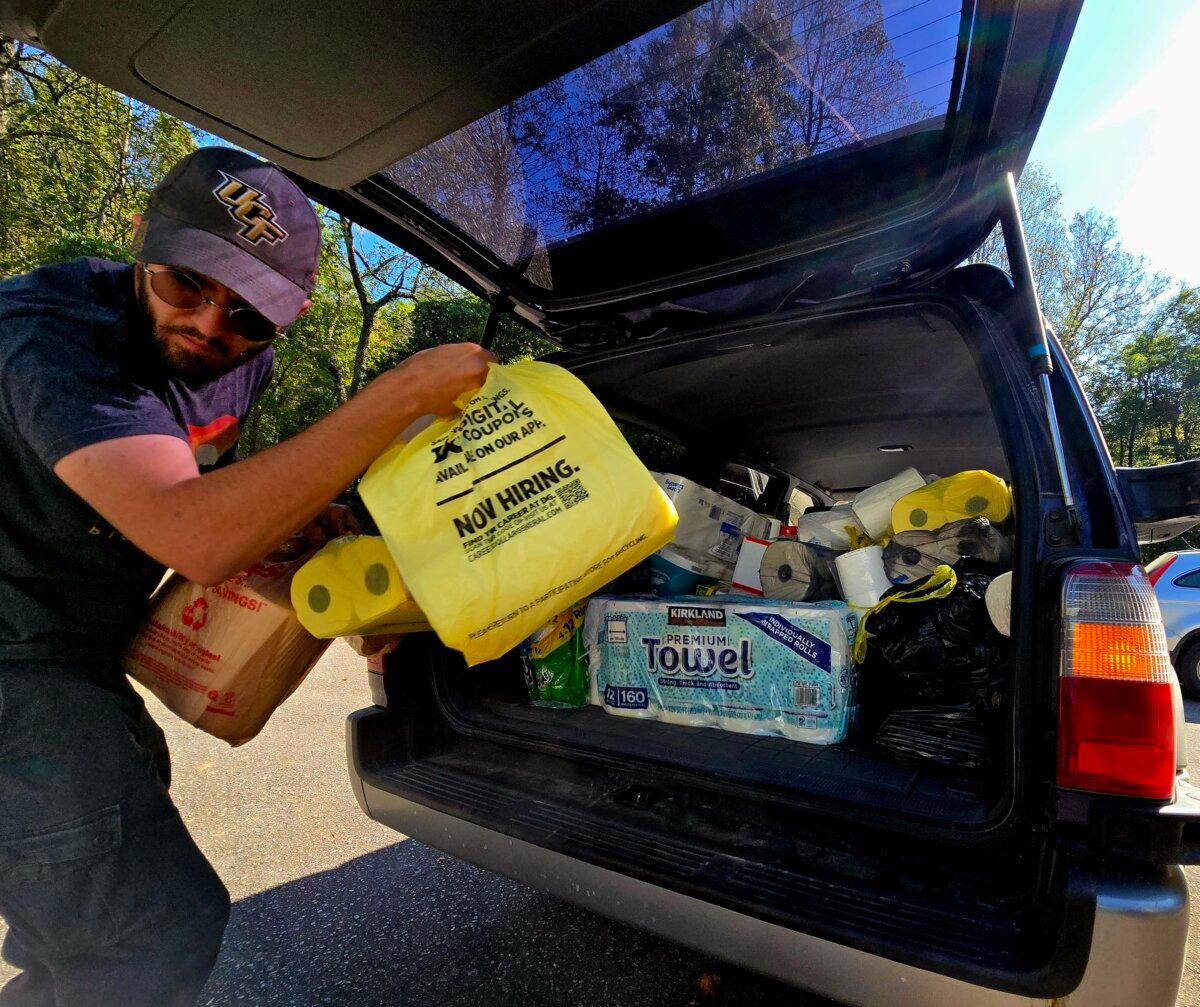
He said the steep mountain terrain made it hard for federal disaster workers to reach the stricken areas. Volunteer helicopter pilots have been leading medical flights and delivering supplies.
Members of the Federal Emergency Management Agency (FEMA) have started to reach these remote areas, George said.
More than 8,000 federal workers in six states and three tribal nations are supporting the response effort.
FEMA stated that it has 20 million meals and 40 million liters of water ready to deploy to ongoing hurricanes Helene and Milton recovery efforts, despite criticism that the federal government has been slow to respond.
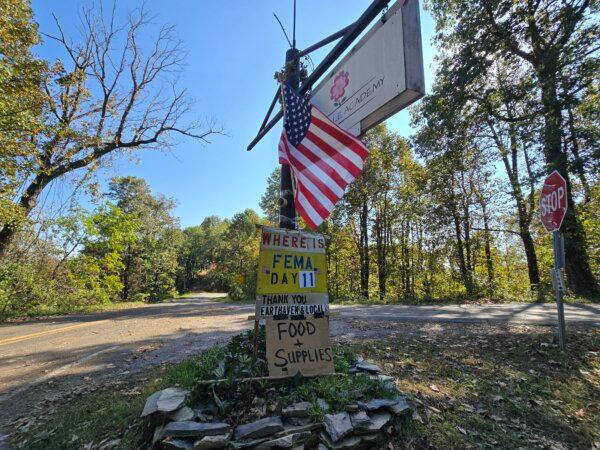
“From what I understand, FEMA was poised and ready from day one,” Honeywell said.
A Perfect Storm
Another busy local distribution hub was the parking lot of the Nesbitt Church Chapel in Fairview, North Carolina. Members of the Air National Guard’s 101st Airborne from Fort Campbell, Kentucky, were there to help with supplies and deliveries.Natalie Wolfe, 38, from Asheville, says she has grown accustomed to heavy rains during hurricane season, but Helene proved to be the perfect storm.
“The weather events that preceded all this made it exactly what it needed to become a terrible flood,” she said. “The scariest part was not knowing how bad it was until you could get out.”
On Sept. 27 at 9:30 a.m., Wolfe was at home when she heard a terrible crash outside her bathroom door.
“I heard glass shattering. My roommate made a noise. I came out and I was like, ‘Are you OK?’ There was a tree in the house—in the living room,” she said.
The two housemates found shelter in the basement until the worst of the hurricane was over. But it took them an entire day to figure out how to navigate the debris and destruction outside the house and get to safety.
“Once you’re out, you see the destruction. That was the biggest shock,” Wolfe, a behavioral therapist, told The Epoch Times.
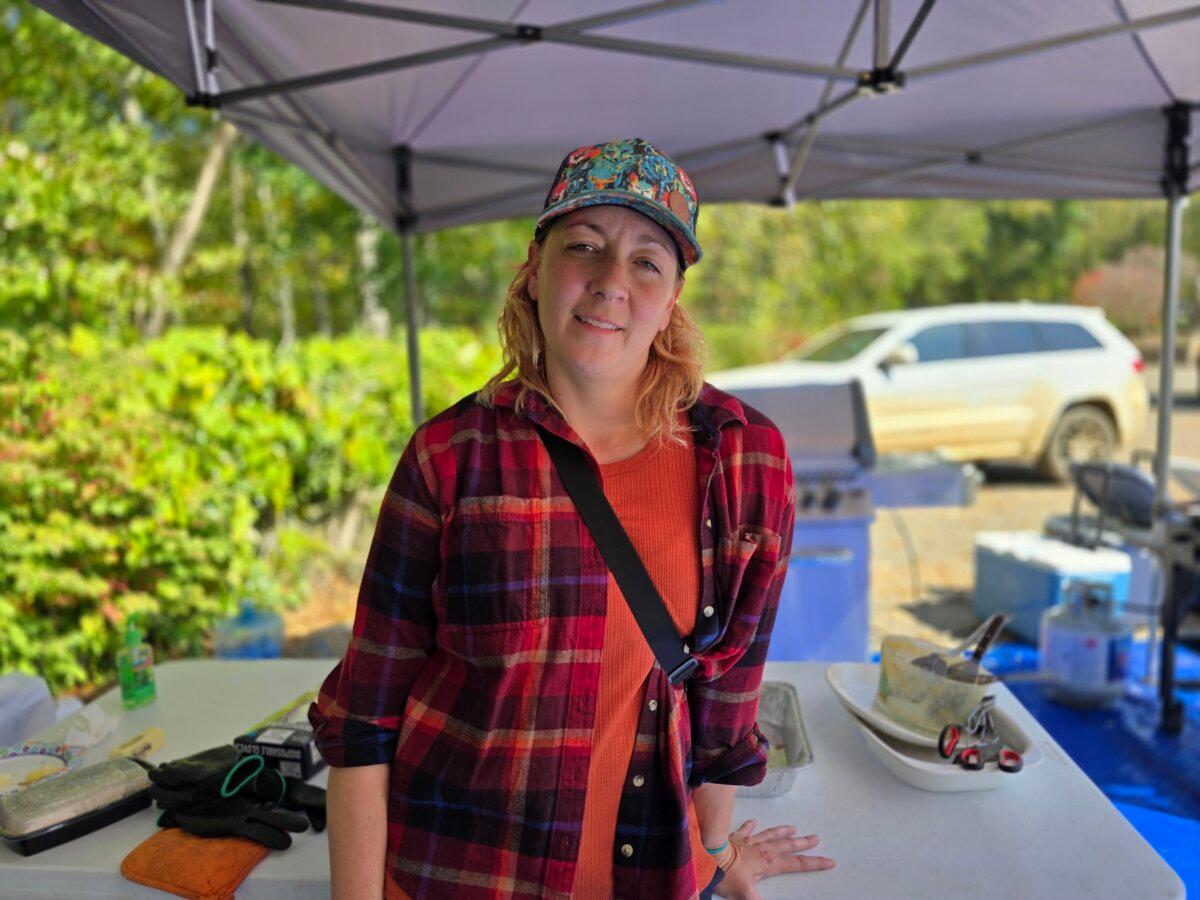
“Once we drove out of the neighborhood, we realized there was destruction everywhere. It was much bigger than just our house.”
The most significant damage came from mudslides caused by rain and loose soil that pulled houses off their foundations, she said.
Wolfe said she is one of the 98 percent of North Carolina residents who are without flood insurance. Her insurance will cover the damage from the tree, however.
“Likely, we'll have to rebuild. We had an insurance adjuster out there,” she said.
“We have a roofer already on it. We unfortunately don’t have flood insurance. But it wasn’t a whole lot of water—thankfully—that came into the house.”
The survivors Wolfe has met have been dealing with a range of emotions: grief, anger, personal trauma, and survivor’s guilt.
“I just let them talk—or cry. I just let them know this is a space to feel however they’re feeling,” she said.
Some people have used the tragedy to express their political opinions, according to Wolfe.
“I’ve already told people off for being political. Just focus on what we can do, not what people are trying to keep us from doing or what we’re not getting,” she said.
Wolfe said some new residents want to move away. Soon, more people could choose to leave or stay based on how much time and money they need to rebuild.
‘Thought I Was Going to Die’
Hurricane survivor Shellye Godfrey, 76, from Fairview, said the overwhelming local support is helping get people the aid they need.She has seen offers of tractors and other heavy equipment, including bulldozers, from her neighbors. Residents armed with chainsaws cleared away fallen trees and branches and made the mountain roads passable.
“It was amazing to watch,” Godfrey said.
“I was at my place for five days. I never saw another human being. One of my friends called the sheriff to do a welfare check. I couldn’t get out of my driveway. I didn’t know what was happening in the world.”
More than once, Godfrey said the horrific force of Helene made her think she was “going to die.”
“It was raining so hard it was horizontal,” she said. “Chunks and rocks—taking houses.”
“I’ve gone through a metamorphosis,” Godfrey said. “I thanked God when I woke up, and my home wasn’t underwater.”
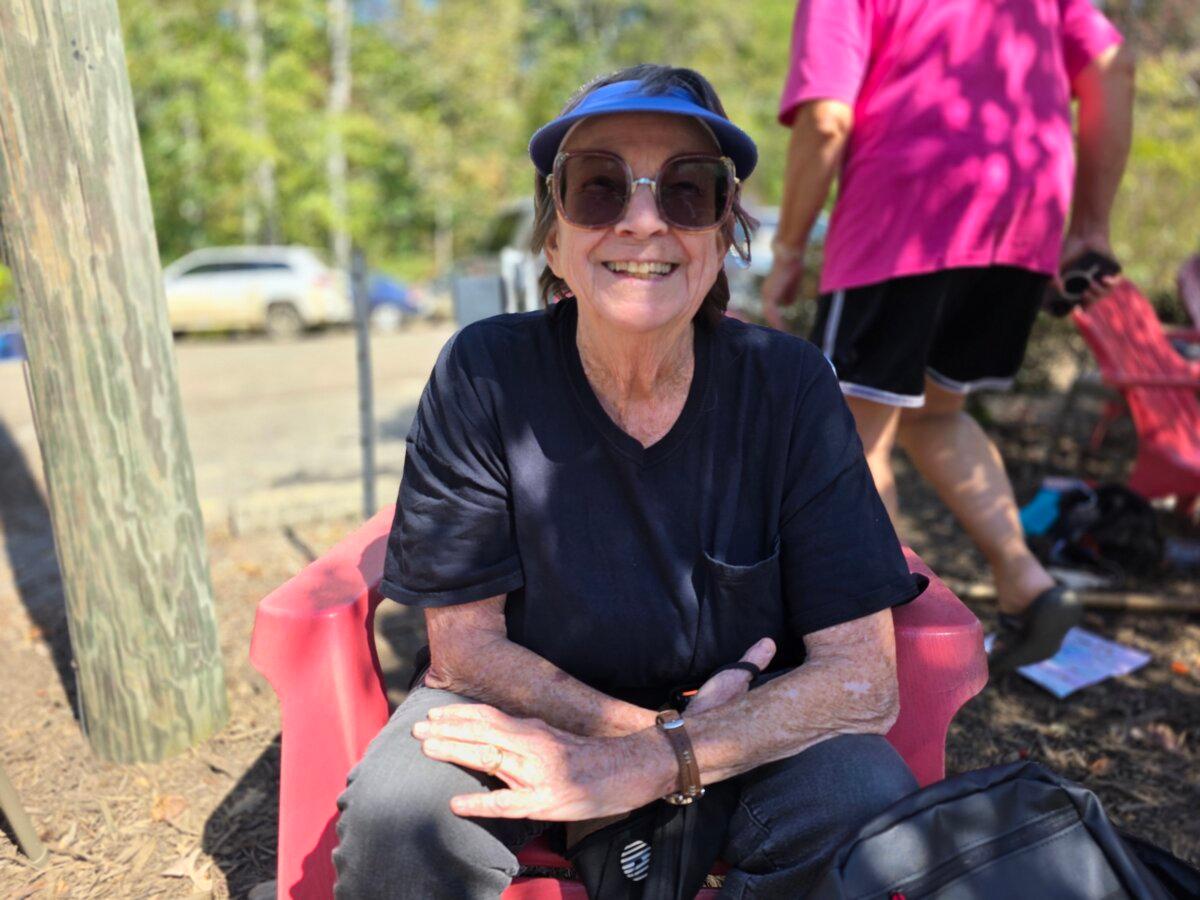
Jackie Garrison, who owns Phil’s BBQ Pit in Black Mountain with her husband, Phil, hustled around the outdoor dining area where clothing lay piled on tables or hanging on racks.
“Thank you, guys. If you put it there, I'll sort it,” Jackie Garrison, breathless, said as she received another armful of clothing from a Samaritan.
It had been a hectic week keeping up with the sheer volume of donations without power or water.
“The response has been overwhelming. It changes hourly,” she said. “My greatest need right now is volunteers to help me sort.”
The most sought-after items included blankets, coats, shoes, and sealed packs of underwear.
“People have lost everything—their homes have washed away,” Garrison said. “Everybody is just glad to be alive. Everybody that still has a home is just very grateful.”
She recalled enduring Hurricane Ivan in 2004.
“We thought that was the worst flooding we'd ever seen in our lives. My husband said it looked like a spring rain compared to this,” Garrison said.
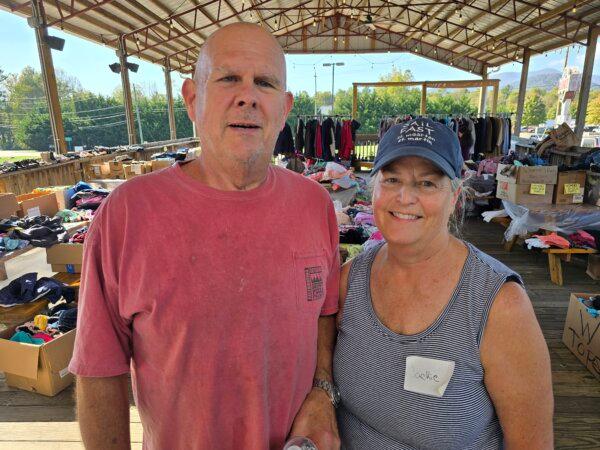
Turning to a survivor, she said, “Thank you, and come back and tell people.”
To a volunteer, she said: “Are you calling it a day? Thank you. I’m coming back tomorrow.”
Keisha Grubbs, 37, from Black Mountain, appeared stressed “just a little.” She had her two young daughters with her and they needed shoes.
“We were fortunate nothing happened to our house,” Grubbs told The Epoch Times. “Our neighborhood is definitely not the same. It is horrible up the mountain. A lot of people lost their lives because of this.”
“We had a tree hit the back of the house but it wasn’t anything super bad.”
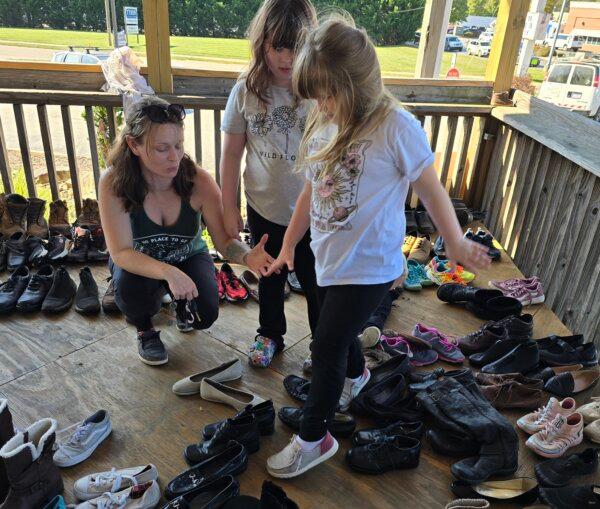
‘Just Lucky’
At Yancey Commons in Burnsville, the United Cajun Navy and Samaritan’s Purse worked together to distribute supplies.Rosa Higgins from Burnsville sat in her pickup truck to get the things she needed for the next few days.
“We’re doing pretty good. We still don’t have any water. We’re just lucky,” she said, adding that she would have to repair water damage to her basement.
“Right now, we’re hoping to get the water back on to begin the cleaning process. It’s just hard to see everybody who’s worse off than we are.”
Chad Rohl, 53, from Burnsville, laughed as he received a liter bottle of what looked like vodka, socks, and protective masks in his pickup truck.
“I know what you’re thinking. It’s hand sanitizer,” Rohl said. “Vodka would’ve worked too—right?”
Rohl said he was thankful that the only things he lost to the storm were trees that had fallen.
Later that day, he planned to drive to Florida and help his brother and fiancee, who were facing Hurricane Milton.
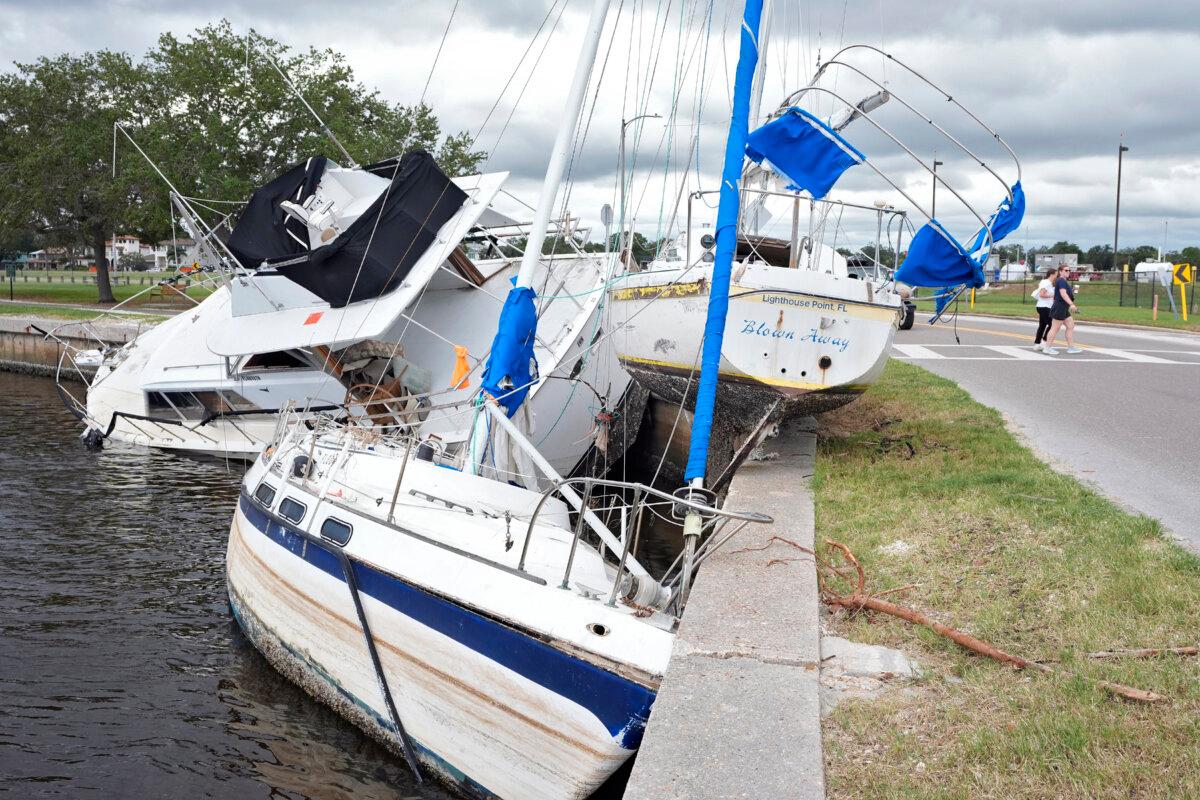
Since most buildings in Burnsville didn’t have water, one visitor looked disappointed by the closed cafe.
Hundreds Without Homes
After the hurricane, the Western North Carolina Agricultural Center in nearby Fletcher became a temporary Red Cross shelter for the hundreds of people who had to evacuate their homes.Richard Byam, a Red Cross volunteer from Massachusetts, said 220 people were living in the shelter, which has a capacity of 300.
He said it was “impossible to say” how long the shelter would remain open as the region continues to rebuild and restore services.
“I anticipate we'll be here for quite some time but it’s not a Red Cross decision,” Byam told The Epoch Times.
“As long as people are without water, power, and sewer, then talk about closing it is meaningless.”
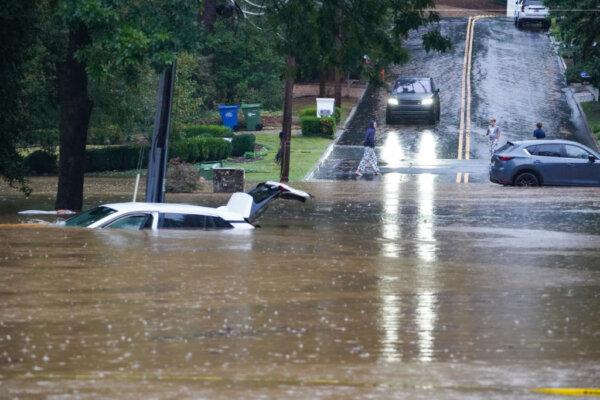
Keith Goodman, 68, a retired U.S. Army veteran, was living in shared housing for veterans when Helene destroyed everything he had.
“I lost everything. It’s just material stuff you can replace,” Goodman, who needs a wheelchair to get around, said.
“It’s another day to me. Wherever they send me” is where I will start again, he said. “It will be a while, I guess.”
His friend Paul Perkins, 53, who has served in the U.S. Army and Air Force, lives in the same building that was damaged by water.
“Right now, that’s my home,” Perkins said, pointing to the WNC Agricultural building.
“Whooh. I lost a lot. In this storm, we lost a bit. FEMA is helping us out. We made a claim. It’s a matter of following through and getting re-established.”
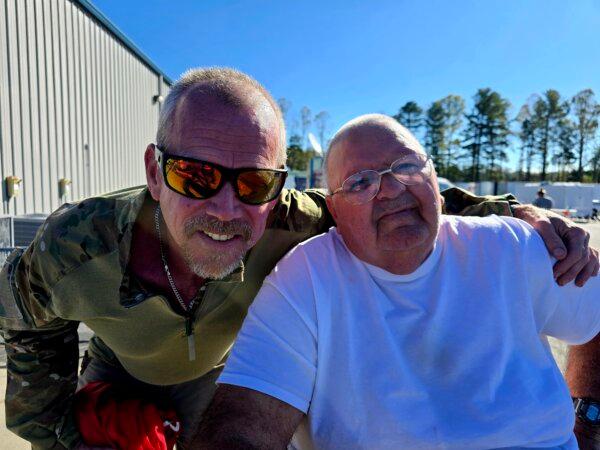
Perkins’s friend Rooster from Asheville wasn’t as lucky. He was trying to reach his dog when he died in the storm.
Another friend survived. “Sandy was just holding onto a surfboard,” Perkins said.
Perkins plans to “stay alive, stay healthy, stay focused, and try to live a dream.”
Help From Above
Sam Parks, a hot air balloon pilot from Statesville, 41 miles north of Charlotte, said that private fixed-wing aircraft and helicopters were crucial to the rescue effort.Parks would later serve as the crew chief on Gary and Diane Heavin’s Bell 505 Jet Ranger helicopter during Operation Air Drop to aid hurricane survivors.
His mission was to take supplies to and people out of the more isolated areas that were severely affected by the storm.
“That’s the reason why the helicopters became so valuable. Our first drop was to take supplies and land either at a fire department or in a field behind a house to pick up passengers that needed to be airlifted out,” Parks told The Epoch Times.
“The helicopters could do things that fixed wings could not.”
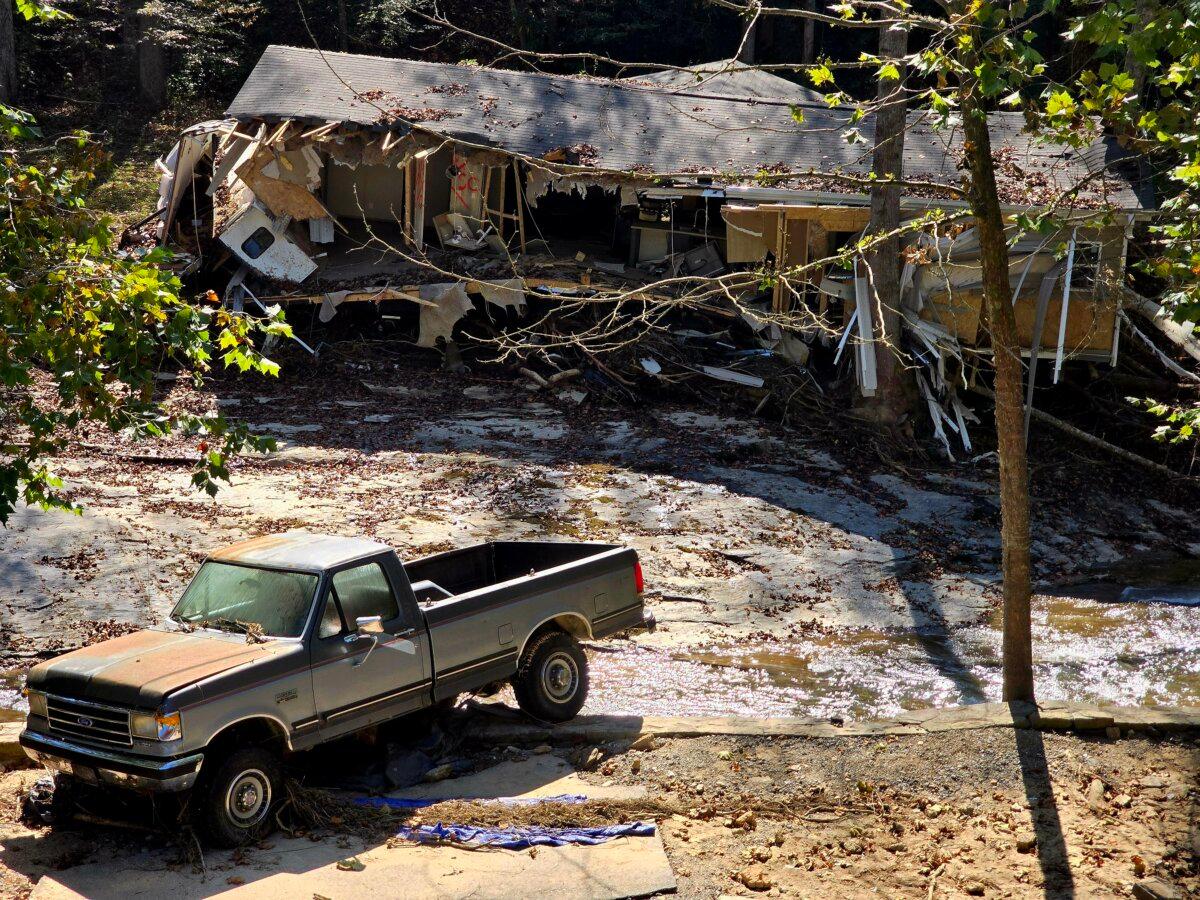
Parks said it took a while for the death and devastation to sink in. Most communities cut off from the outside world were without internet, power, or telephones.
“It was hard to fathom. The places we were flying—Burnsville, Asheville, Green Mountain—I had been to before. The first place we went to was right outside of Burnsville. The amount of water damage completely blew us away,” he said.
“The reason it was so bad in the mountains was because you had some of these elevations as high as 6,000 feet. But then it would all go down to lower elevations through canyons that contained rivers and creeks.
“When you have biblical kind of rain storms—30 to 40 inches—that is the reason why it was devastating. All the water went outside the banks and washed away anything down path.”
Parks said the helicopter flew over the spot where two firefighters escaped floodwaters by cutting a hole in the substation roof.
“We flew literally right on top and saw that 3-by-3-foot hole in the roof and how the [fire] trucks were covered in debris and trees, completely incapacitated. Those men stayed on the roof until the water subsided.”
Each day, his team received a mission card. One assignment involved bringing a cancer patient to the hospital for treatment. His second mission was to land near a house to pick up an injured family.
“I will never forget the image of stepping up and talking to the man and woman who lived in the house. All the windows blew out. The mud line was halfway up the house,” Parks said. “The power lines were all over the place. I’m trying to track down the names of three other people we were supposed to pick up who were their neighbors. It was a mother and two children.”
Parks said that both children drowned in the river, and the mother was still missing.
“It put into perspective the gravity of what I was watching,” Parks said. “The only thing I can say about FEMA is I had a mission where I was supposed to drop gasoline, provisions, and clothes.”
FEMA would take over two of the five helicopter drop locations in Burnsville and, in one instance, turned Parks and his crew away.
“It wasn’t because they didn’t want my goods. They needed to redirect it to a new location,” he said.
“I never experienced any FEMA people in the field that said I couldn’t deliver anything. The only FEMA people I encountered were at schools where I was supposed to do the drop-offs. They just redirected me because they had taken over those locations, and those goods were not being collected there.”
Parks said the airlifting of emergency supplies was a locally driven operation from the very start. The total amount of supplies has been staggering. He said that more than 60 aircraft took part in the operation.
“What you had were people willing to use their aircraft to deliver life-saving medicine. There was a premature baby that I delivered medicine [to] in Burnsville. People were saving lives as a result of civilian efforts,” he said.
“People in North Carolina, we tend to do that. We’re not anti-government. In most cases, we don’t need them.”
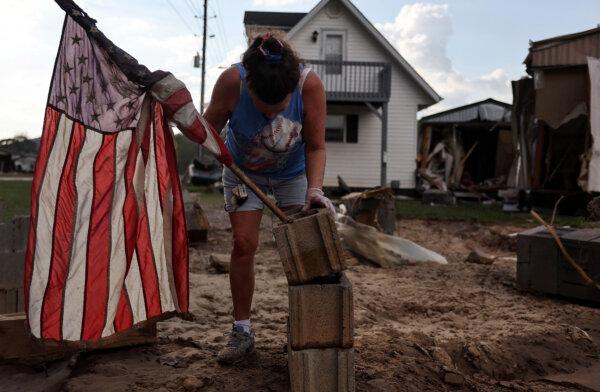
Parks said it could take years for the region to get back to normal—however that might look.
He said sections of heavily damaged commercial routes I-40 and I-26 are still closed, which could affect supply chains.
One thing he’s learned from Helene’s wrath is that “there are givers, and there are takers.”
“It’s always good to be part of the giving group. Givers have given all their lives. It’s good to see that people are willing to give to them in their darkest hour,” Parks said.
